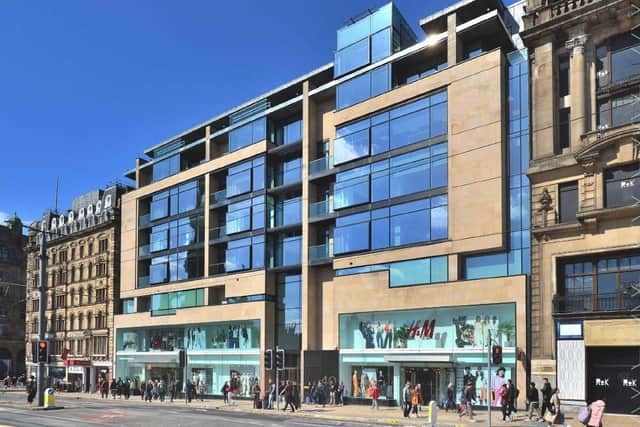Property investment: What's hot and what's not in Scottish marketplace - challenges for 2024
The sector has had to battle a pandemic, the conflict in Ukraine, soaring inflation, rising borrowing costs and sweeping changes on the high street and within office workplaces, but experts are now eyeing something of a recovery over the coming year as deal activity regains momentum. Releasing its latest quarterly review of the Scottish investment market, Lismore Real Estate Advisors said that in terms of pricing, the gap between buyers and sellers has started to narrow.
The report provides a comprehensive insight into the state of the investment market and details the key property transactions that have completed during the past quarter, as well as giving a steer for the year ahead. With a number of larger transactions taking place, the third quarter turned out to be “more positive than anticipated”, Lismore notes, with activity totalling £398 million, which is 17 per cent higher than a year earlier and just 8 per cent shy of the five-year average. While there is an increase in stock coming to the market, the firm anticipates that fourth-quarter volumes are likely to be lower than the five-year average.
Advertisement
Hide AdAdvertisement
Hide AdThe key transactions in the third quarter included the £62.5m (7.5 per cent yield) acquisition of Craigleith Retail Park in Edinburgh by US investor Realty Income from Nuveen. Also in the capital, the prime mixed-use block at 40 Princes Street – home to H&M – was bought by Remake Asset Management for just over £29.5m (7.5 per cent yield) from Redevco. Scotland’s largest outlet centre, in Livingston, was acquired by Global Mutual and Patron Capital for a price of £57m (14 per cent yield), while pension fund manager Weslayan acquired a prime industrial asset let to Biffa at Eurocentral from Capreon for £6.74m (6.2 per cent yield).


The logistics and multi-let industrial sectors remain stable, according to the study, while offices are the hardest area to call with a “real divergence of opinion on future prospects” and where true value lies. Retail warehousing looks like offering “good value”, it added. When looking at buyer activity, funds are said to remain “selective and quite opportunistic”, with “core-plus” buyers starting to see some value in offices, leisure and retail warehousing where values have fallen to a level that debt can be accretive. Stock selection remains paramount, Lismore said, and the patience shown by opportunistic buyers looks like it will be rewarded in the not too distant future.
Unveiling the findings, director Chris Macfarlane said: “While there are encouraging signs at a macro-level, with interest rates peaking, inflation easing and build costs plateauing, it still feels like there are some challenges ahead, particularly for those with historic debt, grappling with the prospect of more expensive re-financing.
“The market will settle and we are anticipating an improvement in investment volumes, as confidence improves over the next 12 months. The recovery is unlikely to be uniform across all sectors but multi-let industrial seems to have weathered the storm better than others and is well-placed to see improvement. It offers good letting prospects, is less capex hungry and a lack of new development all make for a compelling investment rationale.”
He added: “No sector has been immune from the wider macro-economic challenges and the effect that they have had on the market, however, it has not been a uniform slow-down. While the logistics, office and retail markets have seen more significant adjustments, the multi-let industrial sector has fared better. We predict that yields will stabilise into 2024 and investment volumes will increase in the sector as confidence starts to return.”


The firm said its recent investor research showed that more than two-thirds of respondents would be seeking buying opportunities in the multi-let industrial sector during the closing months of 2023, with property companies and investment managers being the most positive. Over the coming 12 months, 46 per cent of respondents expect prime yields in the sector to remain the same, with 56 per cent of investment managers expecting yields to harden.
When asked to rank the key drivers of occupational demand, location was identified as the most important by 54 per cent of respondents, with macro-economic sentiment second on 34 per cent. Just 3 per cent of respondents identified ESG (environmental, social and governance) credentials as the key driver, suggesting that sustainability in the multi-let sector is still being driven by landlords.
Will Lutton, head of Investment at Industrials REIT, one of the top multi-let industrial businesses in the UK, said: “In the short term, we expect rates to remain high and economic conditions to be uncertain, which may to lead to investment opportunities for well capitalised investors, as others struggle to refinance existing holdings. When the underlying risk free rate starts to come down as central banks get comfortable that inflation is under control and we move into a more normalised debt market, yields are likely to harden. In the short term, we anticipate rates remaining high and uncertain economic conditions to continue which may lead to investment opportunities for well capitalised investors.”
Advertisement
Hide AdAdvertisement
Hide AdMeanwhile, water retailer Business Stream has moved headquarters for the first time since it began operations in 2008. The firm has signed a long-term lease at Lochside Crescent in Edinburgh, not far from its previous home at Lochside View, with the 25,618-square-foot deal providing a boost for the capital’s office market.
Comments
Want to join the conversation? Please or to comment on this article.